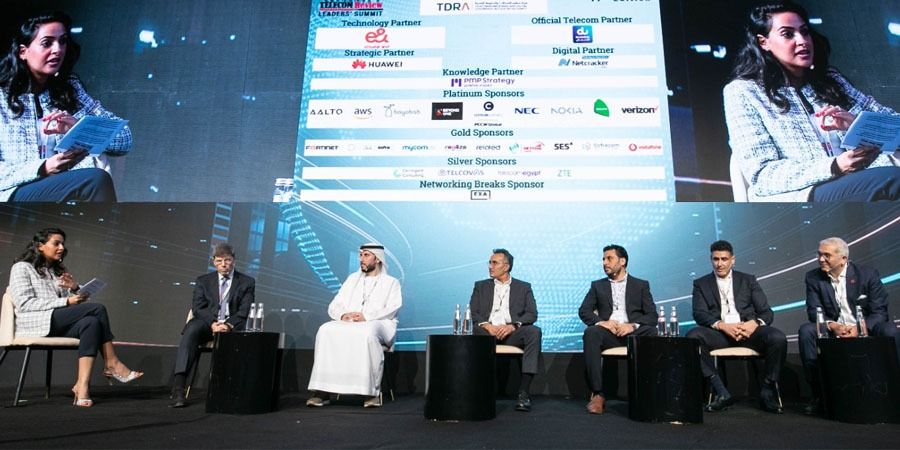Led by moderator Maryam Al Fahad, Regional Director – Business Development, Playbook, the panelists shared insights about how digital transformation has reshaped telcos, the outcomes of their digital strategies, and the importance of digital inclusion for their success.
- Marc Halbfinger, CEO, PCCW Global
- Rashid Alahmedi, COO, InfraX
- Tamer Bdran, Vice President, ICT & Public Safety, NEC
- Mohamed Samir, VP Mobile Networks Middle East, Nokia
- Dr. Bilel Jamoussi, Deputy to the Director and Chief of Telecommunication Standardization Policy Department, TSB, ITU
- Isam Omran, Head of Digital Platform Services, du
Additionally, the panelists delved into the influence of artificial intelligence (AI) on the digital transformation of key sectors, such as healthcare and finance.
The Digital Transformation of Telcos
The digital transformation of telcos has required them to adapt their business models and embrace new technologies. Through digital strategies, telcos have improved customer experiences, expanded their services, and streamlined operations. Advanced networking technologies like 5G and AI and ML algorithms have played a crucial role in enhancing network performance and customer service. Telcos also recognize the social responsibility of digital inclusion, providing affordable access to internet services and supporting digital literacy programs. The integration of AI has had a significant impact on sectors like healthcare and finance, enabling new services and optimizing operations.
Halbfinger stated that “we are at the early stage of 5G enterprise,” and that creating “ubiquity of platforms and networks will ensure that enterprise users can benefit from the value of 5G.” Moreover, he mentioned that 6G will be vendor-driven and applications will drive the demand of infrastructure.
Alahmedi stated that the “convergence of industries is crucial.” Aligned with Digital DEWA's vision to propel Dubai a decade ahead, the roadmap established by InfraX proves mutually beneficial. As a utility, InfraX achieved a significant milestone by creating the first 5G standalone Proof of Concept (PoC) and an all-in-one substation integrating energy and utility across a vast and diverse infrastructure. Scaling up to implement this for smart grid projects is imperative to become a city-scale service provider. Looking ahead to 6G, the public sector stands to benefit, and InfraX aims to provision edge computing, leveraging the power of 6G in proximity to users.
"Two years ago, the industry and users had limited experiences, and now we have evolved," noted Bdran. In the digital transformation journey, considering the mindset and working towards meeting stakeholder expectations are crucial aspects. Telcos are strategically positioned for success in digital transformation, boasting real-life commercial use cases like smart cities and O&G. With ongoing investments in various network facets, the journey is still in progress, but progress is evident, as emphasized by the speaker from NEC.
All mobile service providers play a vital role in digital transformation. Affirming his stand, Samir said that “there is no green without digital.” The digitalization aspect will address flexibility, agility, monetization and IoT. “Digitalization is a journey, not only an operation,” he added as he emphasized Nokia’s partnership ecosystem and Bell Labs initiatives.
25% of early 5G adopters are enterprises. As efforts focus on standardization for 6G, there is a pioneering drive for innovation to establish a prepared ecosystem tailored for these enterprises.
On the other hand, Dr. Jamoussi outlined the two strategic priorities of ITU: universal, meaningful connectivity and sustainable digital transformation. Citing some scenarios, he highlighted the importance of digital identity in secure customer transactions and how diverse countries are in adopting technology and skillset. In terms of mobile money, “if we don’t have an enabling environment between banks and telcos, it will be tough. This is where ITU plays its role in bringing together the ministries of ICT with others.” Dr. Jamoussi also mentioned the ongoing digital transformation of telcos in digital health, automotive and e-government.
Omran emphasized the significance of customer-centric co-creation. Notably, the UAE Pass application has proven to be an excellent example, particularly in the healthcare sector. Achieving a complete digital experience from a telco standpoint relies on the integration of 5G and other technologies. In the 5G space, telcos place a strong focus on smart cities and sustainability, with the ecosystem extending beyond tech partners to include startups and academia.










